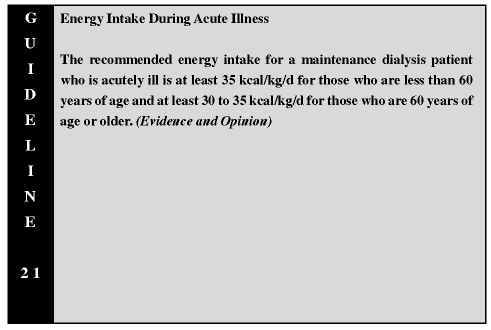
4. Nutritional Counseling and Follow-Up

For the purposes of this guideline, acutely ill refers to an acute medical or surgical illness associated with a state of increased catabolism. Such events would be expected to increase the protein and energy requirements. Hospitalization is not a prerequisite for this definition.
Few data exist on the protein requirements of acutely ill MD patients.138,150,189,190 There are no published data of the energy requirements of acutely ill MD patients. Septic patients with acute renal failure have an increased resting energy expenditure (REE).155 There is no reason to assume that the protein requirements of the acutely ill MD patient is less than that needed by the clinically stable MD patient.60,138,148,150,190,191 The recommended safe protein intake for MHD and CPD patients is considered to be 1.2 g/kg/d and 1.3 g/kg/d, respectively (Guidelines 15 and 16). The recommended daily energy intake for both MHD and CPD patients with light to moderate physical activity is 35 kcal/kg/d for those less than 60 years of age and 30 to 35 kcal/kg/d for those 60 years of age or older (Guideline 17).
Acutely ill, hospitalized MD patients often ingest less than 1.2 or 1.3 g protein/kg/d and are usually in negative nitrogen balance.138,150 On the other hand, hospitalized dialysis patients who were given a mean protein intake of 1.3 g/kg/d or greater, with a non-protein energy intake of 34 ± 6 kcal/kg/d, were able to improve biochemical markers of nutritional status.189 A protein intake of 0.79 g/kg/d or less and an energy intake of 18 ± 8 kcal/d or less is associated with neutral or negative nitrogen balance in hospitalized MHD patients.138 In CAPD patients, hypoalbuminemia is more likely to occur when the protein intake is less than 1.3 g/kg/d and is significantly associated with an increased incidence of peritonitis and more prolonged hospital stays.190 Protein intakes of 1.5 g/kg/d or greater appear to be well tolerated in CPD patients.60,192
Hospitalized MD patients frequently have a decreased energy intake that, in one study, averaged 50% of recommended levels, and this was associated with negative nitrogen balance.138 Hospitalized infected MD patients displayed an increase in serum proteins when their energy intake was 34 kcal/kg/d, and the increase in their serum prealbumin concentrations was directly correlated with the cumulative non-protein energy intake (r = 0.37, P < 0.01).189
For acutely ill individuals without renal disease, greater DPIs, as high as 1.5 to 2.5 g/kg/d, are often recommended.166 It is proposed that these higher protein intakes may preserve or even replete body protein more effectively than lower protein intakes.166,167 These considerations raise the possibility that protein intakes greater than 1.2 or 1.3 g/kg/d may also benefit the catabolic, acutely ill MHD or CPD patient. However, there are no data as to whether these benefits will occur in acutely ill MD patients. Moreover, DPIs in this range, and the attendant increase in water and mineral intake, often will not be well tolerated by MD patients unless they are undergoing more intensive HD with increased dialysis dose (ie, more than three times per week or continuous venovenous hemofiltration with HD [CVVHD]).193,194 Thus, MD patients who receive more intensive dialysis treatment may tolerate protein intakes greater than 1.2 to 1.3 g protein/kg/d. Amino acid losses and, hence, amino acid requirements may increase with more intensive HD (about 10 to 12 g of amino acids removed with each HD)130-132 or with CVVHD (an average of about 5 to 12 g of amino acids per day removed with CVVHD in patients receiving nutritional support).194
Because acutely ill MD patients are generally very inactive physically, their energy needs will be diminished by the extent to which their physical activity has been decreased. In rather sedentary individuals, however, physical activity accounts for only roughly 3% of total daily energy expenditure. In acutely ill nonrenal patients, REE may increase modestly, and daily energy requirements are not increased over normal. Thus, energy intakes of 30 to 35 kcal/kg/d are recommended for acutely ill MHD and CPD patients. The energy provided by the uptake of dextrose or other energy sources from dialysate should be included when calculating energy intake.
It is emphasized that many acutely ill individuals are not able to ingest this quantity of protein or energy,138,150 and tube feeding, IDPN, or TPN may be necessary (Guideline 19). Hospitalized dialysis patients who have evidence of malnutrition at the time of admission may require more immediate nutrition support depending on the adequacy of their nutrient intake. For some patients in whom an extended period of inadequate nutrient intake can be projected, nutritional support should be instituted immediately. These recommendations refer to the acutely ill MD patient. The appropriate nutritional management of the acutely ill patient with acute renal failure may be quite different.195